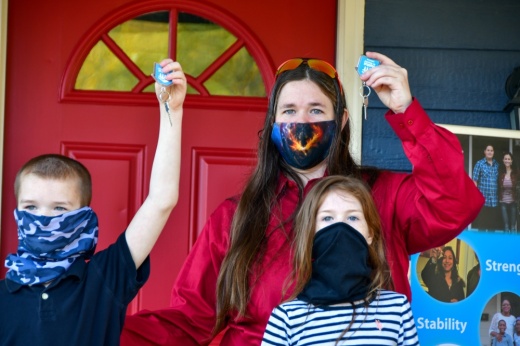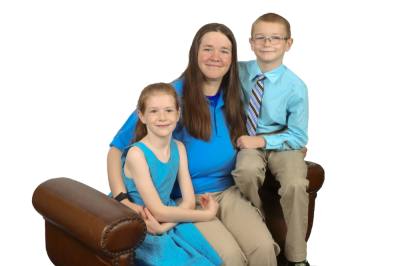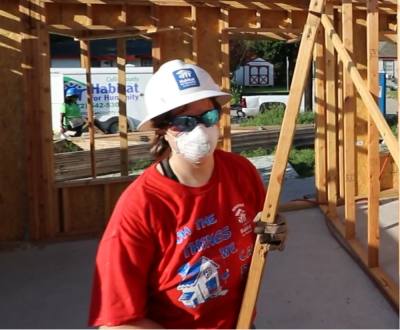In the case of North Texas native Laura Manning, Habitat’s dedication to her wellbeing has made all the difference. Manning is a US Army veteran and single parent of her son Aidan and daughter Emily. She found herself struggling to support her family during the onset of the pandemic.
“I worked at a daycare, [but] hours got cut because kids weren't coming because parents weren't working,” she said. “I was able to work a few hours, about 3 to 5 hours a day.”
The cut reduced Laura’s income by 30% to 60% daily, depending on available hours. As a single parent raising two children, Manning found it more and more difficult to make ends meet. She always dreamed of owning a home, but paying the upfront costs would be impossible.
“[For] most homes you have to have 20% down and the prices [would cost] $30,000 if you're lucky for the cheapest 3-bedroom,” she said. “That's just not really possible for a lot of people but especially single parents that have to work three or four jobs to be able to get the down payment.”
Manning sought help in spring 2019 and found Habitat’s wait list for home assistance for which she applied. However, at the time, she was no longer able to pay rent. Manning and her family moved into Samaritan Inn, a comprehensive program for those without housing in McKinney.
Two weeks after the move, Manning received the call she had been waiting for: her Habitat application had been approved.
Habitat helps people get back on their feet, but the organization does not give away homes for free. There are protocols in place to afford future Habitat homeowners the opportunity to pay mortgages and down payments.
Research shows home mortgages should not be higher than 30% of a family’s income, because anything higher percentage starts to cut into other necessities. The specific mortgage amount is determined through bank statements, pay stubs and monthly income information submitted in the application process.
For the down payment, Habitat homeowners do not pay a traditional 20% down fee. Instead, the program requires sweat equity hours which are hours spent building their own Habitat home, helping build other habitat homes or putting in time at Habitat ReStores.
Manning said she was excited to start work and signed up for the first available safety course where she learned how to take appropriate precautions on construction sites. In addition to working on the build sites, Manning also worked in the Habitat ReStores.
During this time, she continued her Criminal Justice education online at Purdue University Global and in fall 2019, she received a Bachelor of Science in Criminal Justice with a concentration in Juvenile Justice.
Along with her new bachelor’s degree, Manning also started a new job.
“I'm a case manager, and I work at a homeless shelter for youth. So I work with them daily
making sure they have the clothes they need. I make sure they're getting job search help,” she said. “Once they get the job, I make sure they're saving 75% of their income. Once they have saved for a while, I help them to get into an apartment or a program that can help them. So quite a bit of what Habitat did for me, I'm able to do for them now.”
When a two-year-old Habitat home in Wylie opened up for her family, Manning finally received the keys to her Habitat home in November 2020. Her children transferred into Wylie schools and Manning said she has seen amazing changes in her children’s school and social lives since they started their new schools in 2020.
Fast forward to 2022, Manning earned her Master’s Degree in Psychology and hopes to use it to work in juvenile counseling.
“For anything from addiction to family counseling, just really anything, [I just want] to help someone that's in need,” she said.
More than giving someone the keys to a house, Habitat remains a neighborly visitor, knocking on the door to check in, as all good neighbors do and Manning said she can call with any questions or issues.
Because of her experience, Manning plans to become a Habitat mentor, someone who walks new homeowners through the process of sweat equity, home-building and more.
“The Habitat Mentor makes sure that they’re able to make it the whole way through,” she said.
To support stories like this one, donate to Habitat for Humanity of Collin County’s North Texas Giving Day fundraiser. For more information about Habitat’s mission and the people the organization serves, see the website here. To read Laura Manning’s full story, click here.
The above story was produced by Community Impact's Storytelling team with information solely provided by the local business as part of their "sponsored content" purchase through our advertising team. Our integrity promise to our readers is to clearly identify all CI Storytelling posts so they are separate from the content decided upon, researched and written by our journalism department.








